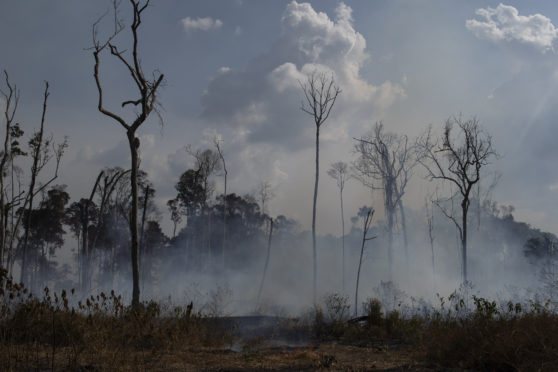
A Scots bank sponsoring a major ethical investment conference has ploughed millions of pounds into agricultural companies fined for links with illegal deforestation in Brazil.
The Royal Bank of Scotland (RBS), which is hosting the Ethical Finance Summit 2019 in Edinburgh next month, has sunk more than £220 million into grain-trading houses Cargill and Bunge.
They were among five firms fined by the Brazilian Government in 2018 for buying almost 3,000 tonnes of grain produced in areas off-limits under environmental rules.
Cargill is the parent company of a factory in Bathgate that makes fish food for Scottish salmon farmers.
The destruction of Brazil’s rainforests – often called the “Lungs of the World” because they produce so much oxygen – has caused an international outcry. Fires are still burning after a summer when more than 80,000 wildfires were reported, an increase of 84% on last year.
President Jair Bolsonaro has been accused of encouraging deforestation to boost farming and forestry.
Dr Richard Dixon, director of Friends of the Earth Scotland, said: “Any company in Scotland that has links to the destruction of the rainforests needs to stop their contribution to this disaster immediately.
“It is hard to imagine how RBS justifies investing in companies caught sourcing illegal soy in Brazil, but the current crisis means it should immediately stop investing in companies complicit in its destruction.
“And Cargill’s Bathgate factory must make sure none of the soy that goes into salmon feed is coming from Brazil and then review whether they really want to work with a company caught fuelling illegal destruction of nature in Brazil.”
RBS is hosting the world summit on ethical finance in Edinburgh on October 8 and 9.
Kirsty Britz, director of sustainable banking with RBS, said: “Doing the right thing for our customers is at the heart of everything we do.
“In bringing together leaders from across the world we want to work across sectors and industries to embed sustainability in finance.”
RBS has provided Cargill with more than £177m in loans and Bunge with almost £50m of investment. The companies were among five firms fined £24m by Brazil’s environmental watchdog in 2018.
Scottish Greens external affairs spokesperson, Ross Greer, said RBS’s activities in Brazil are “steeped in environmental destruction”.
“This publicly-owned institution should act in the public interest and divest immediately,” he added.
Richard George, head of forests at Greenpeace UK, said: “ Any companies sourcing from Cargill and Bunge or any banks investing in them are tainted by association and should take a stand by cutting these destructive companies out of their supply chains and investments.”
An RBS spokesman said: “RBS does not operate in Brazil but we share the worldwide concern over recent increases in deforestation in the Amazon. Whilst we cannot comment on individual cases, we have a clear policy that prevents lending to any projects involving unsustainable vegetation clearance, including the conversion of primary tropical forests and land clearance by burning.
“We also prohibit any lending to companies with direct involvement in illegal logging and/or uncontrolled use of fire for land clearance.”
Cargill and Bunge have challenged Ibama’s ruling (the Brazilian Institute of Environment and Renewable Natural Resources) and denied any wrongdoing. A spokesman for Bunge said: “Bunge presented its legal defence, contesting the findings.”
A Cargill spokeswoman said: “It is in administrative review by Ibama and we have not paid any fines.”

Enjoy the convenience of having The Sunday Post delivered as a digital ePaper straight to your smartphone, tablet or computer.
Subscribe for only £5.49 a month and enjoy all the benefits of the printed paper as a digital replica.
Subscribe